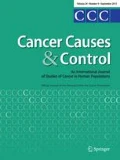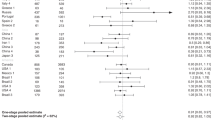Abstract
Introduction
Epidemiological data on green/jasmine tea and esophageal as well as gastric cancer are limited and inconclusive.
Methods
In order to study the effect of jasmine tea in upper gastrointestinal (UGI) cancers, we evaluated 600 esophageal squamous cell carcinoma (ESCC), 598 gastric cardia cancer (GCA), and 316 gastric non-cardia cancer (GNCA) cases and 1,514 age-, gender-, and neighborhood-matched controls. Odds ratios (ORs) and 95% confidence intervals (CIs) were estimated from logistic regression adjusted for matching factors and potential confounders.
Results
Among controls, 35% of males and 8% of females reported consumption of jasmine tea; other tea consumption was rare. Consumption of jasmine tea (ever vs. never) was not associated with risk of ESCC (OR = 1.15, 95% CI 0.92–1.44), GCA (OR = 1.14, 95% CI 0.88–1.37), or GNCA (OR = 0.85, 95% CI 0.64–1.15) in males and females combined. Among males, cumulative lifetime consumption showed a significant positive dose–response relation with ESCC risk, but not for GCA and GNCA. In exploratory analyses, occupation affected the relation between tea and ESCC such that consumption in males was associated with increased risk only in non-office workers.
Conclusion
Overall, we found no evidence for a protective effect of tea in esophageal or gastric cancer. Further studies of the potential effects of thermal damage, tea quality, and water quality on UGI cancers are suggested.
Similar content being viewed by others
References
Parkin DM, Bray F, Ferlay J, Pisani P (2005) Global cancer statistics, 2002. CA Cancer J Clin 55:74–108
(1975) The epidemiology of esophageal cancer in north China and preliminary results in the investigation of its etiological factors. Sci Sin 18:131–148
Carlson JR, Bauer BA, Vincent A, Limburg PJ, Wilson T (2007) Reading the tea leaves: anticarcinogenic properties of (-)-epigallocatechin-3-gallate. Mayo Clin Proc 82:725–732
Chen C, Shen G, Hebbar V, Hu R, Owuor ED, Kong AN (2003) Epigallocatechin-3-gallate-induced stress signals in HT-29 human colon adenocarcinoma cells. Carcinogenesis 24:1369–1378
Kwon OS, Han JH, Yoo HG et al (2007) Human hair growth enhancement in vitro by green tea epigallocatechin-3-gallate (EGCG). Phytomedicine 14:551–555
Feng WY (2006) Metabolism of green tea catechins: an overview. Curr Drug Metab 7:755–809
Friedman M (2007) Overview of antibacterial, antitoxin, antiviral, and antifungal activities of tea flavonoids and teas. Mol Nutr Food Res 51:116–134
Hou Z, Sang S, You H et al (2005) Mechanism of action of (-)-epigallocatechin-3-gallate: auto-oxidation-dependent inactivation of epidermal growth factor receptor and direct effects on growth inhibition in human esophageal cancer KYSE 150 cells. Cancer Res 65:8049–8056
Berletch JB, Liu C, Love WK, Andrews LG, Katiyar SK, Tollefsbol TO (2007) Epigenetic and genetic mechanisms contribute to telomerase inhibition by EGCG. J Cell Biochem 103:509–519
Fang MZ, Wang Y, Ai N et al (2003) Tea polyphenol (-)-epigallocatechin-3-gallate inhibits DNA methyltransferase and reactivates methylation-silenced genes in cancer cell lines. Cancer Res 63:7563–7570
Lee CH, Lee JM, Wu DC et al (2005) Independent and combined effects of alcohol intake, tobacco smoking and betel quid chewing on the risk of esophageal cancer in Taiwan. Int J Cancer 113:475–482
Yuasa Y, Nagasaki H, Akiyama Y et al (2005) Relationship between CDX2 gene methylation and dietary factors in gastric cancer patients. Carcinogenesis 26:193–200
Yang CS, Wang X, Lu G, Picinich SC (2009) Cancer prevention by tea: animal studies, molecular mechanisms and human relevance. Nat Rev Cancer 9:429–439
Chen J (1992) The effects of Chinese tea on the occurrence of esophageal tumors induced by N-nitrosomethylbenzylamine in rats. Prev Med 21:385–391
Han C, Xu Y (1990) The effect of Chinese tea on occurrence of esophageal tumor induced by N-nitrosomethylbenzylamine in rats. Biomed Environ Sci 3:35–42
Zhu JQ, Xiao Y, Liu ZQ, Chen JS, Guo ZL (1991) The effects of Chinese tea on the methylation of DNA by the esophageal carcinogen N-nitrosomethylbenzylamine. Biomed Environ Sci 4:225–231
Castellsague X, Munoz N, De Stefani E, Victora CG, Castelletto R, Rolon PA (2000) Influence of mate drinking, hot beverages and diet on esophageal cancer risk in South America. Int J Cancer 88:658–664
Cook-Mozaffari PJ, Azordegan F, Day NE, Ressicaud A, Sabai C, Aramesh B (1979) Oesophageal cancer studies in the Caspian Littoral of Iran: results of a case-control study. Br J Cancer 39:293–309
De Jong UW, Breslow N, Hong JG, Sridharan M, Shanmugaratnam K (1974) Aetiological factors in oesophageal cancer in Singapore Chinese. Int J Cancer 13:291–303
Gao YT, McLaughlin JK, Blot WJ, Ji BT, Dai Q, Fraumeni JF Jr (1994) Reduced risk of esophageal cancer associated with green tea consumption. J Natl Cancer Inst 86:855–858
Hu J, Nyren O, Wolk A et al (1994) Risk factors for oesophageal cancer in northeast China. Int J Cancer 57:38–46
Islami F, Pourshams A, Nasrollahzadeh D et al (2009) Tea drinking habits and oesophageal cancer in a high risk area in northern Iran: population based case-control study. BMJ 338:b929
Mu LN, Zhou XF, Ding BG et al (2003) Study on the protective effect of green tea on gastric, liver and esophageal cancers. Zhonghua Yu Fang Yi Xue Za Zhi 37:171–173
Murtaza I, Mushtaq D, Margoob MA et al (2006) A study on p53 gene alterations in esophageal squamous cell carcinoma and their correlation to common dietary risk factors among population of the Kashmir valley. World J Gastroenterol 12:4033–4037
Ren A, Han X (1991) Dietary factors and esophageal cancer: a case-control study. Zhonghua Liu Xing Bing Xue Za Zhi 12:200–204
Sharp L, Chilvers CE, Cheng KK et al (2001) Risk factors for squamous cell carcinoma of the oesophagus in women: a case-control study. Br J Cancer 85:1667–1670
Wang JM, Xu B, Rao JY, Shen HB, Xue HC, Jiang QW (2007) Diet habits, alcohol drinking, tobacco smoking, green tea drinking, and the risk of esophageal squamous cell carcinoma in the Chinese population. Eur J Gastroenterol Hepatol 19:171–176
Wang M, Guo C, Li M (1999) A case-control study on the dietary risk factors of upper digestive tract cancer. Zhonghua Liu Xing Bing Xue Za Zhi 20:95–97
Zhang W, An F, Lin H (2001) A case-control study on the risk factors of esophageal cancer in Jieyang City of Guangdong in China. Zhonghua Liu Xing Bing Xue Za Zhi 22:442–445
Ishikawa A, Kuriyama S, Tsubono Y et al (2006) Smoking, alcohol drinking, green tea consumption and the risk of esophageal cancer in Japanese men. J Epidemiol 16:185–192
Kinjo Y, Cui Y, Akiba S et al (1998) Mortality risks of oesophageal cancer associated with hot tea, alcohol, tobacco and diet in Japan. J Epidemiol 8:235–243
Wang LD, Zhou Q, Feng CW et al (2002) Intervention and follow-up on human esophageal precancerous lesions in Henan, northern China, a high-incidence area for esophageal cancer. Gan To Kagaku Ryoho 29(Suppl 1):159–172
Tran GD, Sun XD, Abnet CC et al (2005) Prospective study of risk factors for esophageal and gastric cancers in the Linxian general population trial cohort in China. Int J Cancer 113:456–463
De Jong UW, Day NE, Mounier-Kuhn PL, Haguenauer JP (1972) The relationship between the ingestion of hot coffee and intraoesophageal temperature. Gut 13:24–30
Mosavi-Jarrahi A, Mohagheghi MA (2006) Epidemiology of esophageal cancer in the high-risk population of Iran. Asian Pac J Cancer Prev 7:375–380
Goyal RK, Chaudhury A (2008) Physiology of normal esophageal motility. J Clin Gastroenterol 42:610–619
Chow WH, McLaughlin JK, Malker HS, Linet MS, Weiner JA, Stone BJ (1995) Esophageal cancer and occupation in a cohort of Swedish men. American journal of industrial medicine 27:749–757
Pan G, Takahashi K, Feng Y et al (1999) Nested case-control study of esophageal cancer in relation to occupational exposure to silica and other dusts. American journal of industrial medicine 35:272–280
Xibib S, Meilan H, Moller H et al (2003) Risk factors for oesophageal cancer in Linzhou, China: a case-control study. Asian Pac J Cancer Prev 4:119–124
Zhang XL, Bing Z, Xing Z et al (2003) Research and control of well water pollution in high esophageal cancer areas. World J Gastroenterol 9:1187–1190
Costa LM, Gouveia ST, Nobrega JA (2002) Comparison of heating extraction procedures for Al, Ca, Mg, and Mn in tea samples. Anal Sci 18:313–318
Huang Z, Li Y, Chen B, Yao S (2007) Simultaneous determination of 102 pesticide residues in Chinese teas by gas chromatography-mass spectrometry. J Chromatogr B Analyt Technol Biomed Life Sci 853:154–162
Shu WS, Zhang ZQ, Lan CY, Wong MH (2003) Fluoride and aluminium concentrations of tea plants and tea products from Sichuan Province, PR China. Chemosphere 52:1475–1482
Poirier MC (2004) Chemical-induced DNA damage and human cancer risk. Nat Rev Cancer 4:630–637
van Gijssel HE, Schild LJ, Watt DL et al (2004) Polycyclic aromatic hydrocarbon-DNA adducts determined by semiquantitative immunohistochemistry in human esophageal biopsies taken in 1985. Mutat Res 547:55–62
Bishnoi NR, Mehta U, Sain U, Pandit GG (2005) Quantification of polycyclic aromatic hydrocarbons in tea and coffee samples of Mumbai City (India) by high performance liquid chromatography. Environ Monit Assess 107:399–406
Fontcuberta M, Arques JF, Martinez M et al (2006) Polycyclic aromatic hydrocarbons in food samples collected in Barcelona, Spain. J Food Prot 69:2024–2028
Kayali-Sayadi MN, Rubio-Barroso S, Cuesta-Jimenez MP, Polo-Diez LM (1998) Rapid determination of polycyclic aromatic hydrocarbons in tea infusion samples by high-performance liquid chromatography and fluorimetric detection based on solid-phase extraction. Analyst 123:2145–2148
Lin D, Tu Y, Zhu L (2005) Concentrations and health risk of polycyclic aromatic hydrocarbons in tea. Food Chem Toxicol 43:41–48
Lin D, Zhu L (2004) Polycyclic aromatic hydrocarbons: pollution and source analysis of a black tea. J Agric Food Chem 52:8268–8271
Lin D, Zhu L, Luo L (2006) Factors affecting transfer of polycyclic aromatic hydrocarbons from made tea to tea infusion. J Agric Food Chem 54:4350–4354
Ding YS, Yan XJ, Jain RB et al (2006) Determination of 14 polycyclic aromatic hydrocarbons in mainstream smoke from U.S. brand and non-U.S. brand cigarettes. Environ Sci Technol 40:1133–1138
Tithof PK, Elgayyar M, Cho Y, Guan W, Fisher AB, Peters-Golden M (2002) Polycyclic aromatic hydrocarbons present in cigarette smoke cause endothelial cell apoptosis by a phospholipase A2-dependent mechanism. Faseb J 16:1463–1464
Hoshiyama Y, Kawaguchi T, Miura Y et al (2005) Green tea and stomach cancer—a short review of prospective studies. J Epidemiol 15(Suppl 2):S109–S112
Myung SK, Bae WK, Oh SM et al (2009) Green tea consumption and risk of stomach cancer: a meta-analysis of epidemiologic studies. Int J Cancer 124:670–677
Acknowledgments
This study was supported by the Intramural Research Program of National Institutes of Health, National Cancer Institute, Division of Cancer Epidemiology and Genetics. The funding unit had no role in study design, data collection and analysis, decision to publish, or preparation of the manuscript. Authors thank all the subjects who participated in the study and all the collaborators who contributed to its success. We also want to express our appreciation to Dr. Sholom Wacholder from Biostatistics Branch, DCEG, NCI, for his consultant for our statistical analyses.
Competing interests
We declare that we have no conflict of interest.
Author information
Authors and Affiliations
Corresponding author
Rights and permissions
About this article
Cite this article
Gao, Y., Hu, N., Han, X. et al. Jasmine tea consumption and upper gastrointestinal cancer in China. Cancer Causes Control 20, 1997–2007 (2009). https://doi.org/10.1007/s10552-009-9394-z
Received:
Accepted:
Published:
Issue Date:
DOI: https://doi.org/10.1007/s10552-009-9394-z




